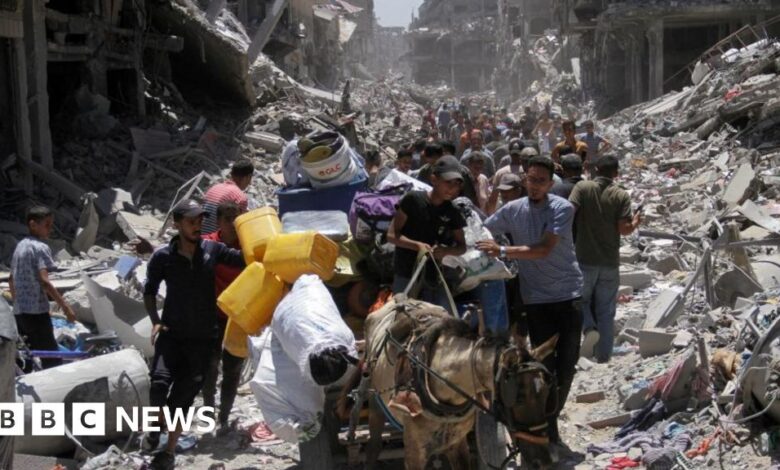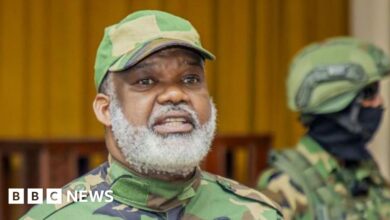There is no ceasefire in Gaza until Israel’s war goals are achieved, Netanyahu said

Israeli Prime Minister Benjamin Netanyahu affirmed that there will be no permanent ceasefire in Gaza until Hamas’s military and administrative capabilities are destroyed and all hostages are released.
His statement came after US President Joe Biden announced that Israel had proposed to Hamas a three-phase plan to achieve a permanent ceasefire.
A senior Hamas politician told the BBC that they “will implement this deal” if Israel does so.
The talks come as fighting continues in Rafah, with reports of Israeli airstrikes on Saturday in the city on Egypt’s border with Gaza.
There is no guarantee that Mr. Biden’s pressure on both Israel and Hamas to accept the plan will lead to a deal.
In a statement Saturday, Netanyahu’s office said Israel’s “conditions for ending the war have not changed.”
It lists these as “the destruction of Hamas’s military and administrative capacity, the release of all hostages and ensuring that Gaza no longer poses a threat to Israel”.
The statement added that Israel would “continue to insist that these conditions be met” before agreeing to a permanent ceasefire, stressing that no agreement could be concluded before meeting them.
On Friday, Mr. Biden described the plan as a comprehensive Israeli proposal that would pave the way for a permanent ceasefire.
The first phase will include a full and complete ceasefire, the withdrawal of Israeli forces from populated areas and the exchange of some hostages for Palestinian prisoners.
This will be followed by the return of all remaining living hostages, including male soldiers.
The final phase will see the remains of any dead Israeli hostages returned, as well as a “massive reconstruction plan” with US and international support to rebuild homes, schools and hospitals, Mr. Biden said.
A complete end to the conflict is Hamas’s main demand for participating in the negotiations.
After Netanyahu reiterated his goals in the war, a Hamas spokesman said they would support the plan if Israel did so.
Basem Naim, a member of the Qatar-based Hamas political office, told the BBC World Service’s Newshour program that the organization welcomed the plan, but that the next step depended on Israel.
Responding to Netanyahu’s statement, he noted that Israel’s goals may not have changed but they have not achieved them either.
“If he tries to continue, he will not find anything but the willingness of Palestinians — all Palestinians — to resist the occupation,” Mr. Naim said.
The proposal put forward by Mr. Biden appears to give both Israel and Hamas an opportunity to say their demands have been met.
For Hamas, it clearly paves the way for a permanent ceasefire, which is the group’s main demand for any deal. They wanted assurances that Israeli troops would not return to Gaza after the hostages were released, and this offer did just that.
This will certainly face opposition in Israel.
Mr. Biden tried to address those concerns by saying that Hamas was so degraded that it was no longer capable of carrying out another major attack on Israel.
However, he admitted that not everyone in Israel would accept the deal but urged the government to resist pressure.
Potential opponents of the plan include far-right members of Netanyahu’s coalition, who have previously threatened to resign in the event of any agreement that leads to an end to the war. war before Hamas was destroyed. This could lead to the end of the Netanyahu government.
However, one of Israel’s most influential opposition politicians, Yair Lapid, has promised to back Netanyahu if he backs the ceasefire agreement.
In a social media post, Mr. Lapid told the Israeli Prime Minister that he “has a safety net for a hostage deal” if far-right allies such as National Security Minister Itamar Ben-Gvir and the Ministry of Finance Minister Bezalel Smotrich leaves the government.
The statement from Mr. Netanyahu’s office appeared to be vague enough for him to claim that his goals had been achieved.
Interestingly, it does not speak of “complete victory” – which he has repeatedly said is the goal of the Israeli military in Gaza.
This omission could allow Netanyahu to dismiss criticism that the deal offers major concessions to Hamas.
Israel has stepped up attacks on the key city of Rafah in recent weeks, claiming control of the entire border with Egypt.
According to Egyptian media, US, Israeli and Egyptian officials will meet in Cairo on Sunday to discuss reopening the Rafah border crossing.
Aid flows into Gaza have been restricted since the border was closed in early May, after Israeli forces took control of the area as part of an offensive to take control of the southern border. of Gaza.
According to the Hamas-run Health Ministry, more than 36,000 people have been killed in Gaza since the start of the conflict.
The war began in October when Hamas gunmen launched an unprecedented attack on Israel, killing about 1,200 people and taking 252 back to Gaza as hostages.




